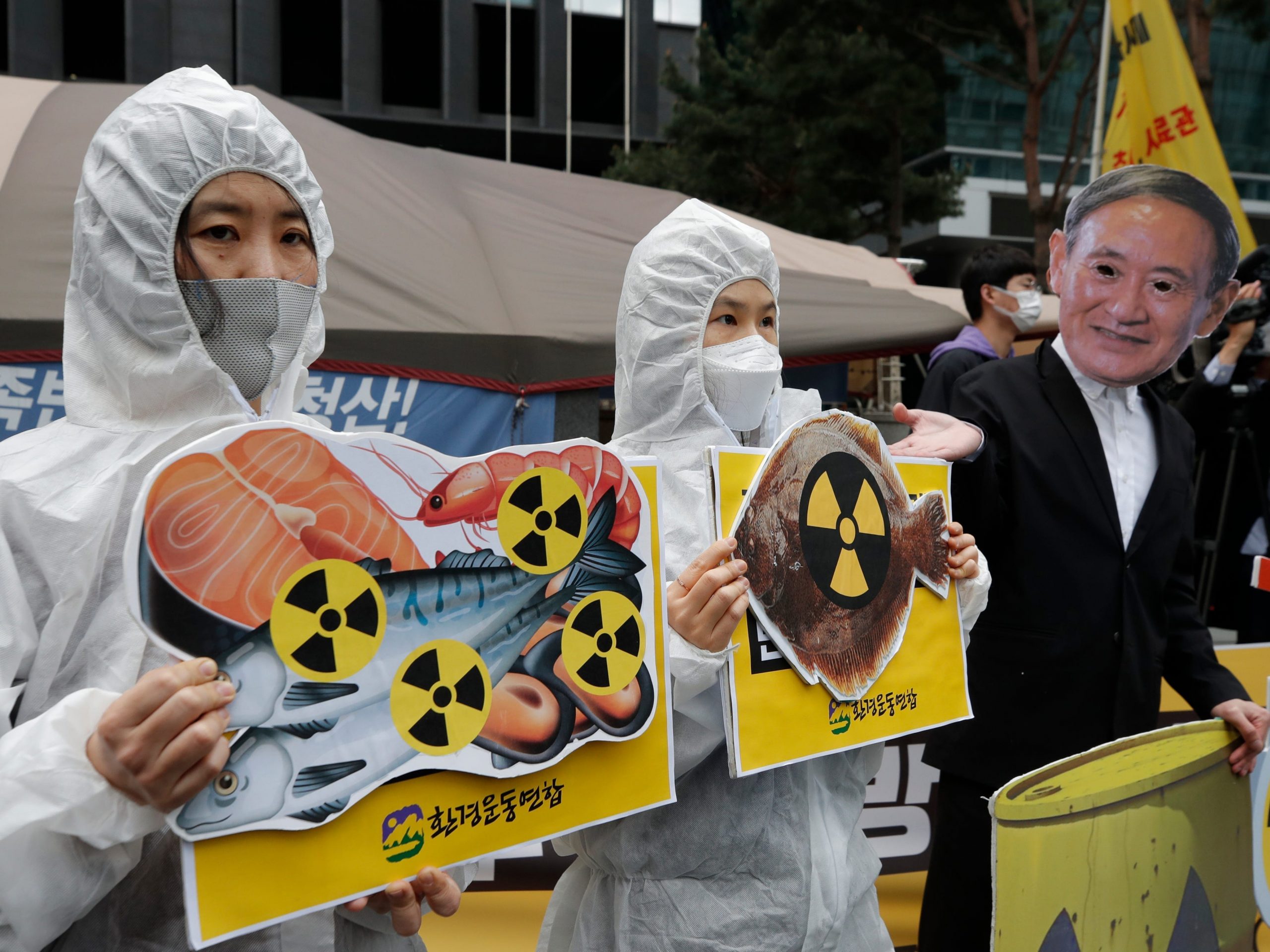
Lee Jin-man/ AP
- Japan's neighbors are not happy about its call to release contaminated water from Fukushima into the sea.
- China and South Korea say the water from the wrecked nuclear plant could affect food safety.
- Hashtags trending on Chinese social media are calling for a boycott of Japanese seafood in protest.
- Visit Insider's homepage for more stories.
Japan has decided to release contaminated water accumulated at the wrecked Fukushima nuclear plant into the Pacific Ocean – but its neighbors are not happy.
Tokyo announced this week that it would gradually release more than 1.2 million tons of radioactive water – enough to fill 500 Olympic-sized swimming pools.
Japan has been storing the water in tanks following the 2011 nuclear plant meltdown, which followed a devastating earthquake and tsunami that devastated northern Japan's coastal regions.
South Korean and Chinese governments have voiced concerns that the radioactive water from the nuclear plant could affect food safety and have grave ramifications on marine life in the area.
According to Kyodo News, civic and environmental groups in South Korea held rallies in Seoul yesterday, holding up placards near the Japanese embassy in Seoul to protest the move. Protesters toted banners with pictures of salmon steaks, prawns, and mussels with radioactive symbols slapped over them, shouting slogans and calling for Japanese Prime Minister Yoshihide Suga to reconsider his decision.
"The sea is not a trash can. The Japanese government has no right at all to dirty the waters," one person at the rally said to Kyodo News.
The decision spawned more than a million comment threads on Chinese social media platform Weibo (the Chinese version of Twitter) in the last 24 hours.
Hashtags including: "Fukushima water could destroy half the Pacific Ocean in 57 days" and "Japan is inflicting a disaster on other nations" surfaced on the platform. Some Weibo users also called for a mass boycott of Japanese seafood, citing worries of "high radioactive content" in fish imported from Japanese suppliers.
Notably, fishing unions in Fukushima have also objected to the Japanese government's move, arguing that releasing the water into the ocean would ruin a decade of work that the fishing industry has invested into restoring its reputation.
The Japanese government assured its neighbors that it would filter the contaminated water before release.
But that statement on its own has not inspired confidence, considering previous scandals that the Tokyo Electric Power Company Holdings (TEPCO) - the corporation involved in handling the water - has been involved in. TEPCO admitted in 2018 that radioactive material had not been filtered out of the water it processed, despite the company maintaining for years that it had.
Reuters reported that South Korea summoned Koichi Aiboshi, Japan's ambassador to Seoul, to formally express objections against the Japanese government's decision.
Koo Yoon-cheol, chief of the South Korean office for government policy coordination, said during an emergency vice-ministerial meeting that the country's government would "take all necessary steps" to keep its citizens safe.
"The decision can never be accepted and would not only cause danger to the safety and maritime environment of neighboring countries. It was also made unilaterally without sufficient consultations with our country, which is the closest neighbor to Japan," Koo said.
"We will strongly demand Japan take concrete steps to ensure the safety of our citizens and prevent any damage to the maritime environment," he added.
Koo also called for transparency regarding how the contaminated water is handled and asked for regular inspections to be carried out.
Separately, Chinese state media Xinhua reported a statement from the Chinese foreign ministry, which slammed the move to release the nuclear water as "extremely irresponsible."
"The Fukushima nuclear accident is one of the most serious in the world. The leak of large amounts of radioactive materials has had far-reaching implications on the marine environment, food safety, and human health," Chinese foreign ministry spokesman Zhao Lijian said.
The Chinese also called the Pacific Ocean "mankind's shared property" while strongly urging Japan to "fulfill its international obligations, and duly respond to the serious concerns of the international community, neighboring countries, and its own people."
Dit artikel is oorspronkelijk verschenen op z24.nl